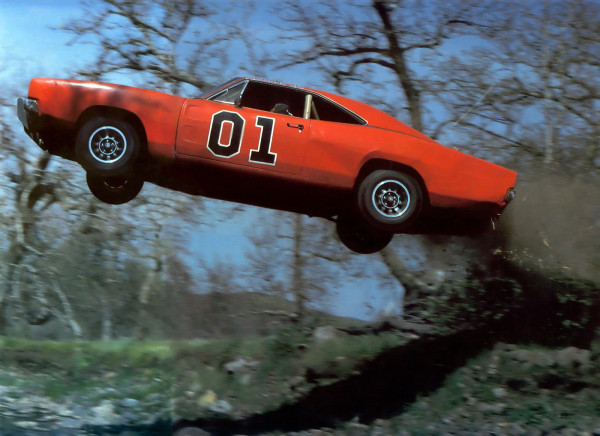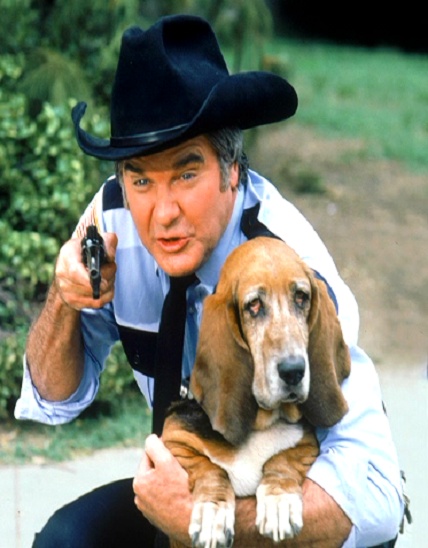In Hazzard County, they do things different. Two of its residents, Bo and Luke Duke, are cousins who fight the system. They confront the evil machinations of Boss Hogg—the corrupt county commissioner who owns most of the property and businesses in Hazzard. Bo and Luke are “good old boys” with “hearts of gold” who genuinely want to confront evil and overcome it. They are frequently undaunted in their courage as they chase down Roscoe P. Coltrane—Boss Hogg’s deputy—and stop him from perpetuating Hogg’s greedy schemes.
Many of the Dukes escapades involve car chases (overdubbed by playful bluegrass music) in their souped-up Dodge Charger, the General Lee. While driving they exchange funny quips like this:

Luke: “You know, Bo, you could lose your way on a racetrack.”
Bo: “Burt Reynolds never seems to get lost.”
Luke: “He’s got a mustache.”
The Dukes of Hazzard had a pretty big impact on my formative years. I was five years old when the first episode aired and eleven when the boys retired from television. I was captivated by their cuteness and inspired by their spunk. They were my underdog heroes and I adored them.
But I learned some things from the “good old boys” that maybe weren’t so, well, good.
I learned from the Dukes that we can balance the scale of iniquity as long as our intentions are generally good. In real life we call this compromise. Their story begins with Bo and Luke on probation for five years for running moonshine for their uncle Jesse. Many of their escapades involve similarly shady dealings and they are often enticed into situations that make them violate the terms of their probation, such as helping “Swamp Molly”, an old moonshining friend of Jesse’s, make one last run. They do this because Molly once saved Jesses from the Fed’s and he “owes her one.”
This is a familiar TV show tactic. The reformed bad guy is tempted to relapse out of guilt. On a show like the Dukes of Hazzard, the “good guys” usually wiggle out of their conundrum with a little elbow grease and a grin. In dramatic films the storyline serves as an object lesson, such as the character of Carlito Brigante, as played by Al Pacinio in Carlito’s Way. The reason why these stories are dangerous is that we learn compromise is okay as long as the ends justify the means.
“The heart is deceitful above all things, and desperately sick; who can understand it? I the Lord search the heart and test the mind, to give every man according to his ways, according to the fruit of his deeds.”
Jeremiah 17:9-10
Another problem is that our small compromises often turn into big compromises. When we rationalize one behavior we are quicker to rationalize others. Compromise in the area of living a healthy lifestyle leads to regression. One cheat day turns into two and then ten, and finally abandonment of a healthy lifestyle altogether. If for no other reason, compromise is hazardous to your health!
Compromise also fuels greed; one of the significant themes that run through the show. Boss Hogg is blatantly greedy. He is frequently shown wearing a bib, eating fried chicken, and concocting plans to get richer than he already is. He is a horrendous hypocrite and never takes responsibility for his bad behavior. If not for those “meddling kids” he would make life a living hell for the residents of Hazzard County.
So when Boss finally gets what he wants—the deed to the Duke’s farm—via foreclosure, it is with a certain sense of irony that Boss learns he has a terminal illness and will probably die within two weeks. He suddenly gets really scared of eternal consequences and decides to change his ways. Boss gives the deed back—at least until he finds out his diagnosis is a mistake
—then he reverts to his evil ways once again. And since greed is very entertaining, we are all somewhat relieved to see Boss scheming for how to bilk folks and torment those Duke boys once again.
In real life greed is vile and evil, not a punchline for a joke. Greed prompts us to steal office supplies from our place of employment. It whispers that we can be married and sleep with the next door neighbor. It tricks us by inciting illicit passions that cause us to eat the whole pizza, not just one slice.
Greed fosters the mentality that we can get something for nothing. The Lottery and gambling establishments would not exist if not for greed. Simply put, greed is a black hole that takes but is never satisfied. It exists because of our sin nature and is only quenched by replacing false pleasures with real ones.
Sin is always acting, always conceiving, always seducing and tempting.
John Owen
Like Boss Hogg we rarely confront our greed until we are faced with the consequences of our behavior. Greed is hazardous because it promises more while delivering less.

Sheriff Rosco P. Coltrane has a famous saying, “Cuff ’em and Stuff ’em!” He says this every time he apprehends someone. But frequently the apprehended parties (usually Bo and Luke Duke) wiggle free and poor Rosco is left stuttering in the dust and scrambling to catch up. This is how we generally manage our hazardous behavior. We make a valiant effort with our weak and floppy hands to get our raging appetites under control only to watch our resolve crumble when real temptation strikes. The cycle of guilt and shame erupts around us in a cloud of dust and chokes us half to death. But there is a better way.
The beautiful message of the gospel is simply this: life and peace. When we ask Jesus to be Lord of our lives we experience the incredible joy that freedom from sins entails. Television programs like the Dukes of Hazzard are fun to watch but they reinforce a wrong idea; namely, that God is boring and wants to stifle our good time. They celebrate ideas like compromise and greed. They enchant us with cute characters that blur the lines between good and evil. Unfortunately, sometimes they encourage us to believe we can save ourselves.
I’m not saying all television and movies are bad. I enjoy a well told story. In fact, I still enjoy watching The Dukes of Hazzard. But I love Jesus more and He has opened my eyes to the hazards some programs promote.
Jesus wants to manage our mischief for us. If we surrender our will to him, the fruit of our trees will be love, joy, peace, patience, kindness, goodness, faithfulness, gentleness, and self-control. (Galatians 5:22-23) This does not mean will are free from temptation. It simply means that He sends the Holy Spirit to help us in our weakness. If we know Jesus and do not cling to this promise, we need to pray for more grace to help us better understand it. In my case, for far too many years I made a habit of loving my sin more than I loved God. I did not understand the beauty of friendship with God and so I choose food and many other vices that kept me in a perpetual cloud of dust. But once I had exhausted my store of endurance and began to learn how to lean on the everlasting arms, I found a love sweeter than chocolate and more satisfying than ice cream. I invited God to walk with me and to teach me how to love him more than cookies. Only then did he set me free. If you are reading this, no matter what hazardous lanes you have been driving in, he can set you free too!
Today I encourage you to get out of the danger zones and manage your mischief permanently! Surrender your life to the giver of all good things and discover the wonder walking with him entails. You will never regret it.





A little bit long. I also kept waiting for a reference to Harry Potter that ended with “mischief managed.”
You hit the nail on the head with the idea that tv promotes how “God is boring and wants to stifle our good time.” That is the message of the world today. The terrible consequences are seen every day in headline news.